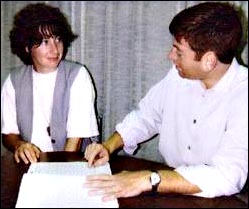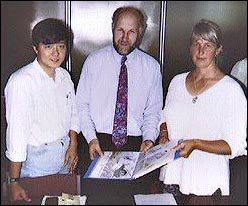– Dorothy – 27/2/97
“There’s no job for me at present. I’d love to be self-employed but I don’t know enough to start a business. I haven’t enough confidence.”
That has been the cry of so many people in New Zealand wanting to make a change in their lives.
Some have been made redundant. Some have travelled overseas and come back to find it hard to fit back into the work force. Some have developed a hobby into a part-time business but are worried that it will not earn enough to support them if they give up a less interesting job. Some have had health problems or accidents that have forced them to change direction. Others are men and women retiring from the army. Some are women wanting to return to the workforce. Some have come from other countries especially in Asia or the Middle East. Some have come out of prison and found it hard to get a job. Some have retired, but want to use their years of freedom to develop a small business.
Where do these people find the training that they need? Many courses have been set up to train people to run a business of their own. One source of training has been the network of Small Business Enterprise Centres operating in many cities and towns throughout the country. I have been lucky enough to work for nearly ten years in the Christchurch centre with groups who are a fascinating mix of rich diversity.
What are they taught on the course? They learn to wrestle with the complexities of record keeping, accounting, taxation, costing and pricing goods and services, and working out a budget
 |
| Charlotte Mundy checks Sam Coley’s business plan for Hyperaudio Productions. |
and a cashflow forecast. They look at the legal structures involved, at insurance and leasing of premises, and work out their marketing strategies. All this they write up in a business plan and an experienced adviser checks the plan through with them and advises them of changes needed. Charlotte Mundy is one of the advisors and is a graduate in commerce from Lincoln University and has also had experience in a family business, so she is well placed to help.
To ensure that they make a positive impact when they talk or write to customers or clients as they start in business there are sessions on communication. Stress and time management are also taught to emphasise the need for self care as they work towards their goal of self-employment.
How do they pay for the courses? The New Zealand Employment Service funds many registered unemployed people to a three week full time course and the Community Employment Group funds suitable applicants to a four week course.
What types of business are they starting? The range is enormous:
- professional services in areas like Health and Safety in the workplace, teaching, architectural design, hotel management, stress management courses, nursing services, desk top publishing, and Web page design
- the creative arts – writing and illustrating books, radio productions, graphic design, fashion garments, stained glass, writing and performing music, hand crafted jewellery and bone and wood carving
- services to property owners – landscape design, garden maintenance, cleaning, upholstery, painting, plumbing. plastering and decorating.
- tourism ventures, manufacturing, retail, and catering
How successful are these businesses? Lindsay Jeffs, manager of the centre, says that this is difficult to gauge as some people start businesses in other centres or at a later date. The
 |
| Lindsay Jeffs and Nelson Saavedra look at a children’s book written and illustrated by Jill Allpress. |
staff give practical advice which sometimes means that people are told that their idea is not viable – which saves a lot of wasted effort, money and heartache.
Some of the people with businesses that have been running well are Richard Lloyd with a glass studio at Darfield, Melanie Cordes taking tours around New Zealand, Alan Harris who handcrafts a wide range of woodware, Melanie Jones with garments that have featured in high fashion contests, and Julian Carver of Promethean Web Design.
So many people I have met on these courses are getting help to make changes and follow their dreams. This help comes not just from the staff but from the vital and enthusiastic people who attend the courses. Graduation day is a landmark on the journey to the fulfilment of the dreams. People Making Changes Main Page




